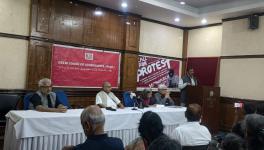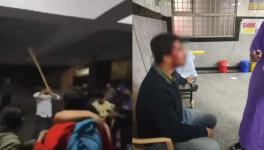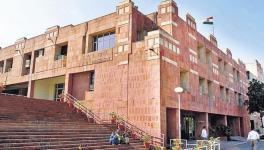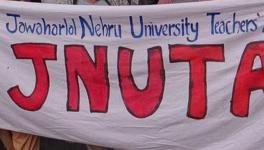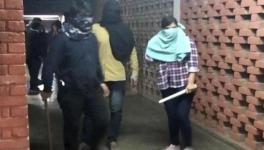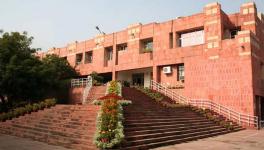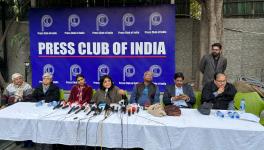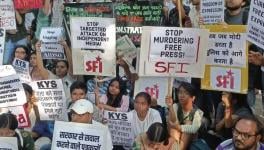JNU: Not Only Press, Attack Is On Academicians Too, Say Teachers
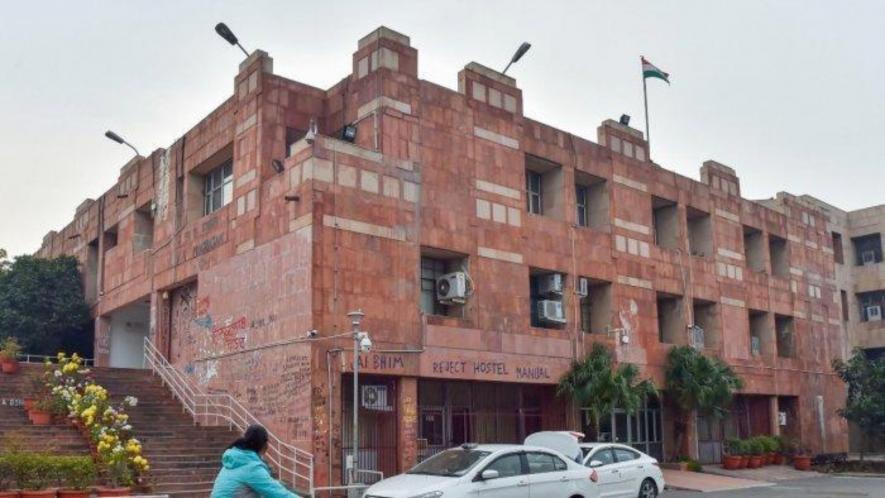
Image Courtesy: PTI
New Delhi: The teachers, students, journalists and lawyers came down heavily on the Bharatiya Janata Party (BJP) -led Central Government on the recent raids on the journalists by the Special Cell of the Delhi Police in connection with the news portal NewsClick. In a public meeting organised jointly by Jawaharlal Nehru University Students Union (JNUSU) and Jawaharlal Nehru University Teachers Association (JNUTA) at Sabarmati Dhaba on Tuesday evening, the participants said that academicians, like journalists, have been targeted for expressing their views.
D K Lobiyal, President of JNUTA, told NewsClick that it was a frightening day on the campus when two residents of the campus were raided. He said another home was searched in speculation that the resident was working for NewsClick. However, they did not find anything.
He said the university has seen attacks from 2016 under the current regime. “We deliberately wanted to discuss the attack on press freedom and democracy because the raids were not meant to frighten the journalists alone. It’s for academicians, too. Just like the BJP does not believe in any dialogue, the administration has engaged in monologue. The teachers on the campus were also issued circulars about referring to Pakistani authors. However, it was not debated much. The teachers are frightened, too and cannot express their views openly on the policy matters. We are seeing that campus democracy is being crushed. The Delhi University can have student body elections, but JNU cannot.”
The ruling party was criticised after Ashoka University Professor Sabyasachi Das presented a research paper which indicated the ruling party's manipulation of election results in a few constituencies in the 2019 general elections.
Talking to NewsClick on the sidelines of the meeting, Aishe Ghosh, President of JNUSU, said that the students in the university are too affected by the developments in the form of raids on the journalists. The student community has seen quite well how their movement for affordable education was demonised by traditional media groups supportive of the ruling party. Thus, it becomes imperative to stand for press freedom.
She said, “We saw that parents would come to us during admission assistance programmes to say that they are witnessing a different campus and students contrary to the image portrayed by mainstream news channels. However, millions of families cannot come to the campus to see the reality. To them, we are still freeloaders surviving on taxpayers' money, and it deeply impacted us. The journalists who want to set the record straight with facts that JNU would have become the most expensive central university are being attacked. The students are also citizens, and they are unanimous in protest.”
She added, “We first saw the attacks which were considered isolated on progressive writers like Govind Pansare, Gauri Lankesh and Narendra Dabholkar, but it has taken a systemic form now where the state is directly involved in propaganda about channels to be followed and boycotted. Hate campaigns by the channels, too, impacted the campuses where Muslim and Dalit students were attacked. Now, the attack has moved towards digital news portals which have taken pro-people issues and raised them.”
Warisha Farasat, author and lawyer, said that it is beyond comprehension how anti-terror law can be applied towards journalists. “When I look back at 2016, I still find it a happy memory in comparison with the present day. Section 13 of the Unlawful Activities Prevention Act talks about unlawful activities. Still, it is generally section 15 and section 16 that are applied in most of the cases which deal with terror activities. When we look back at 2016, we find that the focus was to apply section 124 A of the Indian Penal Code to implicate you, but it has now come full circle to UAPA because bail is an impossibility here.”
She said the Supreme Court also made it more stringent by laying down additional thresholds in the National Investigation Agency versus Zahoor Ahmad Shah Watali case. The authorities, too, know that journalists did not commit anything wrong. Yet, it is applied to put them behind bars for the longest period.”
She added that the citizens must ask the judiciary about the non-applicability of mind in cases of UAPA. Before the bail application is moved, the person is produced for remand, and the judge must apply his mind from the beginning only, and the law explicitly talks about it. However, it has been done away with. “Our justice delivery system is not delivering, and the union and state government are aware of it and use it to silence its critics. I have no solutions to offer, but the judiciary must find answers to restore faith in justice,” she said.
Narrating her harrowing experience of covering the demolition of Muslim fishermen’s houses in Gujarat, Journalist Sabah Gurmat said that freelance journalists are finding it increasingly difficult to cover stories as they completely lack institutional support from newsrooms in the face of any police actions. “We have a twofold challenge in the sense that freelancers are prone to attacks, and editors in big newsrooms simply do not show any interest in protecting us even when they assign stories. So, young journalists who entered the field with idealism are losing hope these days,” Gurmat said.
Get the latest reports & analysis with people's perspective on Protests, movements & deep analytical videos, discussions of the current affairs in your Telegram app. Subscribe to NewsClick's Telegram channel & get Real-Time updates on stories, as they get published on our website.










